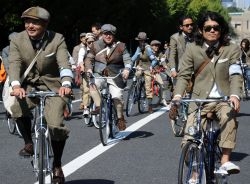Tweed takes over Tokyo for Japan Fashion Week

While some were kitted out in the full deerstalker set that would not look out of place on a British stag hunt, others added a Tokyo twist to the traditional material, donning tweed blousons or sneakers.
“What’s attractive about tweed is the way it feels, and that stays with it when it is used in unconventional items like training shoes or a baseball jacket,” said Keisuke Ikeya, who took part in the “Tweed Run Tokyo” ride wearing a jacket made from tweed patchwork.
“Take these shoes,” he said, pointing to his casual footwear. “Tokyo is a city of concrete, and tweed sneakers fit this environment.
“It’s so Tokyo, I would say. We are using this traditional fabric in many modern ways. It’s part of the diversity of fashion.”
Tokyo has long been the centre of cool, renowned around the world for its far-out fashions that see young women wearing gothic-inspired “Lolita” outfits and chiseled young men with high quiff hair.
But even as trends come and go, traditional tweed, especially the authentic Harris Tweed handwoven fabric, has remained enormously popular as a must-have item in Japan — the world’s biggest market for the material.
The journey to Tokyo is a long one. Authentic Harris Tweed comes only from the far northwestern tip of Scotland, where winter nights are long and summer days go on forever.
If it’s not handwoven from pure virgin wool by islanders in the Outer Hebrides, dyed and spun in the Outer Hebrides and finished in the Outer Hebrides, it’s not the genuine article, according to the Harris Tweed Authority, which sets the standard for a material that is a staple of royal wardrobes.
Tweed has fought off the onslaught of the industrial age to rise against cheap machine-made copies dashed out in the Far East.
While low cost will always come up trumps for some customers, many at the higher end will only ever choose the real thing, something especially true in Japan, the destination for more than 40 percent of all the Harris Tweed exported in 2012.
“Tweed is being used in completely different ways now,” said Kazunobu Hirayama, a manager at The Woolmark Company in Japan.
“But that is because the fabric has the quality, even if that is not immediately visible,” he said. “That is the quality supported by history. No matter how casual the style it is applied to, it still looks stylish overall.”
Katsura Hatsushika, who was on the Tweed Run with two female friends, carried a Harris Tweed teddy bear, whose paws were made from patches of the fabric.
“Originally Harris Tweed jackets were very heavy for women, and we still cannot find feminine styles easily,” she said.
“I think we have created many cute tweed items here, including even stationery, like a pen case. I think it’s a very Japanese way of doing things.”
The 2014 Spring/Summer Japan Fashion Week runs until Saturday.

